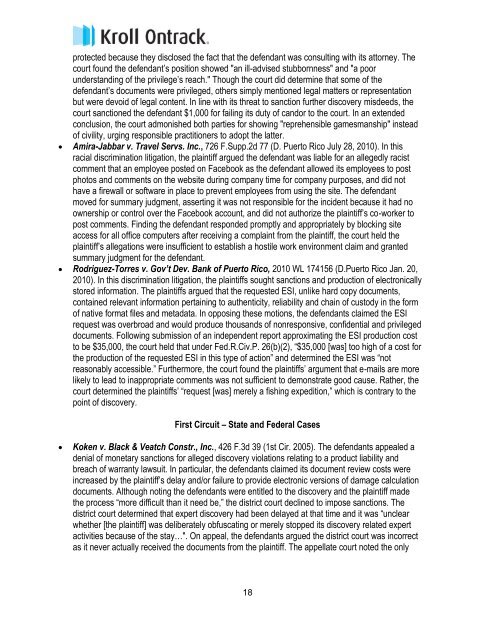Electronic Discovery and Computer Forensics Case List - Kroll Ontrack
Electronic Discovery and Computer Forensics Case List - Kroll Ontrack
Electronic Discovery and Computer Forensics Case List - Kroll Ontrack
You also want an ePaper? Increase the reach of your titles
YUMPU automatically turns print PDFs into web optimized ePapers that Google loves.
protected because they disclosed the fact that the defendant was consulting with its attorney. The<br />
court found the defendant’s position showed "an ill-advised stubbornness" <strong>and</strong> "a poor<br />
underst<strong>and</strong>ing of the privilege’s reach." Though the court did determine that some of the<br />
defendant’s documents were privileged, others simply mentioned legal matters or representation<br />
but were devoid of legal content. In line with its threat to sanction further discovery misdeeds, the<br />
court sanctioned the defendant $1,000 for failing its duty of c<strong>and</strong>or to the court. In an extended<br />
conclusion, the court admonished both parties for showing "reprehensible gamesmanship" instead<br />
of civility, urging responsible practitioners to adopt the latter.<br />
� Amira-Jabbar v. Travel Servs. Inc., 726 F.Supp.2d 77 (D. Puerto Rico July 28, 2010). In this<br />
racial discrimination litigation, the plaintiff argued the defendant was liable for an allegedly racist<br />
comment that an employee posted on Facebook as the defendant allowed its employees to post<br />
photos <strong>and</strong> comments on the website during company time for company purposes, <strong>and</strong> did not<br />
have a firewall or software in place to prevent employees from using the site. The defendant<br />
moved for summary judgment, asserting it was not responsible for the incident because it had no<br />
ownership or control over the Facebook account, <strong>and</strong> did not authorize the plaintiff’s co-worker to<br />
post comments. Finding the defendant responded promptly <strong>and</strong> appropriately by blocking site<br />
access for all office computers after receiving a complaint from the plaintiff, the court held the<br />
plaintiff’s allegations were insufficient to establish a hostile work environment claim <strong>and</strong> granted<br />
summary judgment for the defendant.<br />
� Rodriguez-Torres v. Gov’t Dev. Bank of Puerto Rico, 2010 WL 174156 (D.Puerto Rico Jan. 20,<br />
2010). In this discrimination litigation, the plaintiffs sought sanctions <strong>and</strong> production of electronically<br />
stored information. The plaintiffs argued that the requested ESI, unlike hard copy documents,<br />
contained relevant information pertaining to authenticity, reliability <strong>and</strong> chain of custody in the form<br />
of native format files <strong>and</strong> metadata. In opposing these motions, the defendants claimed the ESI<br />
request was overbroad <strong>and</strong> would produce thous<strong>and</strong>s of nonresponsive, confidential <strong>and</strong> privileged<br />
documents. Following submission of an independent report approximating the ESI production cost<br />
to be $35,000, the court held that under Fed.R.Civ.P. 26(b)(2), “$35,000 [was] too high of a cost for<br />
the production of the requested ESI in this type of action” <strong>and</strong> determined the ESI was “not<br />
reasonably accessible.” Furthermore, the court found the plaintiffs’ argument that e-mails are more<br />
likely to lead to inappropriate comments was not sufficient to demonstrate good cause. Rather, the<br />
court determined the plaintiffs’ “request [was] merely a fishing expedition,” which is contrary to the<br />
point of discovery.<br />
First Circuit – State <strong>and</strong> Federal <strong>Case</strong>s<br />
� Koken v. Black & Veatch Constr., Inc., 426 F.3d 39 (1st Cir. 2005). The defendants appealed a<br />
denial of monetary sanctions for alleged discovery violations relating to a product liability <strong>and</strong><br />
breach of warranty lawsuit. In particular, the defendants claimed its document review costs were<br />
increased by the plaintiff’s delay <strong>and</strong>/or failure to provide electronic versions of damage calculation<br />
documents. Although noting the defendants were entitled to the discovery <strong>and</strong> the plaintiff made<br />
the process “more difficult than it need be,” the district court declined to impose sanctions. The<br />
district court determined that expert discovery had been delayed at that time <strong>and</strong> it was “unclear<br />
whether [the plaintiff] was deliberately obfuscating or merely stopped its discovery related expert<br />
activities because of the stay…". On appeal, the defendants argued the district court was incorrect<br />
as it never actually received the documents from the plaintiff. The appellate court noted the only<br />
18

















